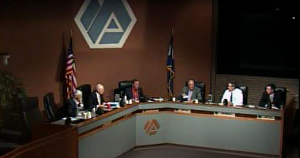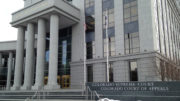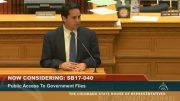By Jeffrey A. Roberts
CFOIC Executive Director
A judge in Jefferson County has thrown out a citizen’s lawsuit against Arvada for using secret ballots to fill a vacant council seat, ruling that he lacks legal standing to sue the city for violating that aspect of Colorado’s Open Meetings Law.
Arvada resident Russell Weisfield claimed that the City Council’s Jan. 10 decision to install new member Jerry Marks was illegal because councilmembers marked unsigned sheets of paper four times to eliminate other candidates before settling on Marks.
Asking that Marks’ appointment be invalidated, Weisfield cited a provision added to the Open Meetings Law in 2012 that prohibits the state or any local public body from using secret ballots to adopt “any proposed policy, position, resolution, rule, or regulation” or to take “formal action.”
District Court Judge Margie Enquist acknowledged in her Mar. 30 finding that “the voting procedure may have violated the secret ballot provision” of the statute. But she ruled against Weisfield because the two-year-old law does not expressly “confer standing on every citizen for a violation of that provision.”
“Thus, this court declines to find that every citizen of Colorado has standing to bring a claim for violation of the Open Meeting Law’s prohibition on the use of secret ballots and, as a result, Plaintiff has failed to sufficiently allege that he personally suffered injury to a legally-protected statutory interest,” Enquist wrote.
Steve Zansberg, a First Amendment attorney and president of the Colorado Freedom of Information Coalition, called the decision “astounding and breathtaking.”
“If left uncorrected on appeal, the judge’s ruling would essentially render the Open Meetings Law a dead letter, unenforceable by anyone who did not suffer a direct injury as a result of a violation of the statute,” Zansberg said. “That is plainly not the intent of, nor the statutory text codified by, the General Assembly.”
The state legislature enacted the prohibition against secret ballots following a Colorado Court of Appeals ruling that the Fort Morgan City Council did not violate Colorado’s Sunshine Law when it used anonymous written ballots to appoint two council members and a municipal judge in 2009 and 2010.
Weisfield’s lawyers, according to the judge’s decision, argued that the 2012 law “creates in all citizens a legally protected interest in government transparency and/or knowing what is on a ballot concerning a position or formal action.”
But Enquist said Weisfield never showed that he had been harmed by the procedure that selected Marks. The judge noted that he wasn’t among the finalists for the council vacancy, and he didn’t allege that Marks is “failing to adequately represent his interests” as a resident of council District 1.
The city of Arvada has maintained that the council didn’t violate the law because the final unanimous vote for Marks was public. The four secret ballots “were not official and were part of the discussion process,” according to city spokeswoman Jill McGranahan.
Follow the Colorado Freedom of Information Coalition on Twitter @CoFOIC. Like CFOIC’s Facebook page. Do you appreciate the information and resources provided by CFOIC? Please consider making a tax-deductible donation.





